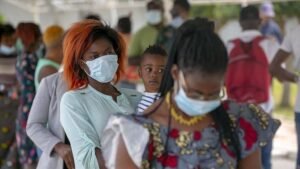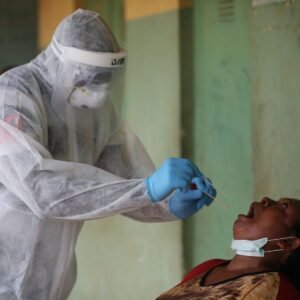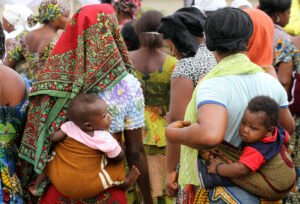COVID-19 Response In Nigeria: Where is the Accountability and How Strategic is the Purchasing of Health Services?

By: Uchenna Ewelike, Uchenna Ezenwaka,Chikezie Nwankwor, Benjamin Uzochukwu and Obinna Onwujekwe
Health is a fundamental human right; thus, access to this basic right of an individual should be protected and guaranteed to citizens of all nations irrespective of the prevailing circumstances. However, the greatest challenge to this right of the citizens is the financial resource constraints in achieving unhindered access to quality healthcare for all residents in a nation, including Nigerians. We know that the demand for health care is inelastic meaning that people will go ahead to pay for whatever services they need at all cost to improve their health status. Therefore principles of efficiency and accountability should guide all health interventions and not just limited to the coronavirus response.
Read full blog
====
What Factors Hinder Progress Towards Strategic Purchasing for Healthcare in Imo state, South East Nigeria?
By: Charles Ezenduka, Eric Obikeze, BSC Uzochukwu, Obinna Onwujekwe
As part of the global agenda to achieve access to efficient, equitable, affordable and quality healthcare to the population, countries have committed to attaining Universal Health Coverage (UHC). Strategic health purchasing (SHP), as a core function of healthcare financing, is critical to achieving UHC, linking resource mobilisation to pooling, ensuring efficient and equitable delivery of healthcare [1]. Strategic purchasing enhances improvement in the healthcare system by promoting quality, efficiency, equity and responsiveness of service delivery, thereby facilitating progress towards UHC [2]. Given the global focus towards SHP to achieve optimum health system performance [3], countries have committed to SHP, leading to health system reforms. Effective implementation of SHP requires putting in place structures and mechanisms that support activities that enhance improvement of system performance. However, evidence shows increasing challenges in implementing SHP in low and middle-income countries, ranging from unsatisfactory benefit packages, low service quality and challenges with provider payment mechanisms, making healthcare purchasing remain mostly passive [4, 5].
Read full blog
====
Towards strategic health purchasing for UHC: recognizing and mitigating the consequences of multiple and mixed provider payments mechanisms in Abia State
By: Chinyere Mbachu, Chinyere Okeke, Chinonso Obayi, Irene Eze, Benjamin Uzochukwu, Obinna Onwujekwe
Although public health expenditure is low in Nigeria, healthcare purchasing has been predominantly passive and inefficient, meaning that limited resources are wasted (Etiaba et al., 2018). Recent health financing reforms in Nigeria recognize the critical roles of State governments and related agencies in defining, implementing and managing healthcare purchasing functions within decentralized health financing mechanisms; in the hope that a decentralized approach will fast-track the country’s achievements of universal health coverage (UHC) by 2030 (Chu et al., 2019). In Abia State, healthcare has been predominantly financed through out-of-pocket payments (OOP) and State government budgetary allocation. The State has recently established a health insurance agency with plans to roll-out a mandatory contributory social health insurance scheme for all citizens and residents within 2020. In this blog, we review provider payment mechanisms (PPMs) used by the state’s health budget and the proposed Abia state social health insurance scheme and provide recommendations to harmonize the multiple and mixed PPMs.
Read full blog
====
Improving the efficiency of resource allocation for COVID-19 response in Imo State – the role of strategic purchasing
By: Charles Ezenduka, Eric Obikeze, BSC Uzochukwu, Obinna Onwujekwe
The Covid-19 pandemic has resulted in wide scale social and economic implications and has had a huge impact on people’s lives, families and communities [1]. In response to the Covid-19 pandemic, countries have reconfigured their systems to provide required services to contain the pandemic, deploying preventive equipment, testing services, intensive care units (ICU) beds, health commodities, and home care services. Meanwhile, countries also face the challenge of sustaining healthcare services for other health conditions. However, the major challenge remains the increase in healthcare costs above previously planned budgets, beyond what the health system can absorb.
Read full blog
====
Evaluating Strategic Health Purchasing Functions in Improving Effectiveness and Efficiency of Resources Allocated for COVID-19 Response in Abia State
By: Irene Eze, Chinyere Mbachu, Chinyere Okeke, Benjamin Uzochukwu, Obinna Onwujekwe
Abia state was free of COVID-19 until March 29, 2020, when two sick persons tested positive for the virus. The effect of the pandemic on the physical, social and economic well-being of Abians is evident. There was a decrease in workforce participation across all sectors due to job losses followed by an economic crisis and recession. In contrast, the need for medical supplies shot up with disruption of the entire healthcare system. Policymakers were struggling with decisions on where limited resources would be applied to meet the needs of the pandemic and non-COVID-19 services. This emphasized the need for strategic health purchasing (SHP) to select which interventions to purchase, how and from whom, to be adopted for an adequate response to the pandemic and sustaining non-COVID-19 health services. Abia State government has put in measures to contain the disease and meet the changing health needs of their people. However, the question is, how strategic are these health purchasing arrangements?
Read full blog
====
Incidence and Case Fatality rate for COVID-19 in Enugu State, Southeast Nigeria: An opportunity to make the right investment and improve strategic health purchasing in the health sector
By: Henry E. Aloh, Ifeyinwa Arize, Daniel Ogbuabor, Benjamin Uzochukwu and Obinna Onwujekwe
A novel severe acute respiratory syndrome coronavirus-2 (SARS-CoV-2) known to be responsible for an infectious disease called coronavirus disease 2019 (COVID-19) was first identified and reported from Wuhan city of China in December, 2019 [1]. SARS-CoV-2 is highly contagious, spreading globally in a very short period of time, and was declared a global pandemic by the World Health Organization on March 11, 2020 [2]. Since then the number of cases continues to rise throughout the globe and has become a serious menace to public health [3]. Africa confirmed its first case of COVID-19 in Egypt on 14th of February, 2020, and Nigeria reported the first on 27th of February [4, 5]. Enugu State recorded its first two (2) cases on March 28th, 2020 [6] and the spread of the virus has been steadily rising in the state.
Read full blog
====
Social Health Insurance and Strategic Health Purchasing in Nigeria
By: Chikezie Nwankwor, Uchenna Ezenwaka, Benjamin Uzochukwu, Uchenna Ewelike, and Obinna Onwujekwe
In Nigeria, there are about 4.3% of Nigerians registered in one form of social health insurance programme or the other. The National Health Insurance Scheme (NHIS) is the agency responsible for social health insurance. It provides the primary purchasing function of setting guidelines and standards for the social health insurance programmes in the country. NHIS also ensures the accreditation of providers and Health Maintenance Organisations (HMO). As simple as it sounds, NHIS’ mandate is to provide easy access to quality health care services and help achieve universal health coverage (UHC) for the Nigerian population.
Read full blog
The Health Policy Research Group (HPRG) with its base at the College of Medicine, University of Nigeria, Enugu Campus (UNEC) was established in 2002.
It is covered by the legal incorporation of the College of Medicine of the University of Nigeria, Enugu-campus.
Contact Us
- tel: +2348037007771; +2348033130050; +2348032442695; +2349095201921; +2347034437569
- E-mail : hprg@unn.edu.ng; hprgnig18@gmail.com; info@hprgunn.com; obinna.onwujekwe@unn.edu.ng
- Address : Old UNTH, Enugu, Nigeria
Sign up for Hprg UNN newsletter and be informed about our latest updates
We have latest Resources, Publications, Journals and news Blog for you. Let’s know if you wish to have a look
© 2025 ALL RIGHTS RESERVED | HEALTH POLICY RESEARCH GROUP UNN


